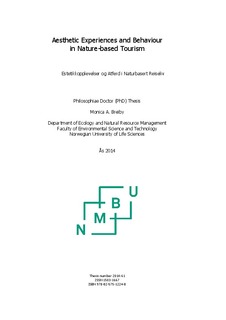| dc.description.abstract | With the increasing focus on aesthetic experiences and symbolic values of products and services, this thesis addresses central aesthetic dimensions in nature-based experiences, and how they are linked to tourist behaviour. It empirically investigates the multidisciplinary concept of aesthetics from both key informants’ and customers’ perspectives. In particular, the thesis extends previous research by focusing on the man-made environments in nature areas.
The overall goal of this thesis is twofold. First, it aims to gain knowledge of central aesthetic dimensions in nature-based tourism. Second, it aims to gain knowledge of how these aesthetic dimensions influence the variables satisfaction, positive emotions, and customer loyalty. To achieve these aims, the concept of aesthetics as a phenomenon is explored in four papers. The methods used for data collection are interviews and a survey in a nature-based context.
The dissertation opens up the research area with regard to aesthetics and behaviour in naturebased tourism. This is one of the first systematic studies, which contributes to develop researchbased knowledge of the role aesthetic qualities play in the tourists’ preferences. Specifically, the dissertation offers three main contributions to tourism research. First, the thesis presents key informants’ and tourists’ understandings of central aesthetic dimensions that may influence tourists’ satisfaction and positive emotions from nature-based experiences. One of the main findings is that both key informants and tourists mentioned the four aesthetic dimensions “harmony”, “variation/contrast”, “scenery/viewing”, and “genuineness”. In addition, key informants emphasized “art/architecture” and tourists emphasized “cleanliness”. The findings show that the dimensions “harmony” and “genuineness” are especially important for the manmade environment, while the dimensions “variation/contrast” and “scenery/viewing” are especially important for the natural environment.
The thesis also contributes to furthering our understanding of the effects of aesthetic dimensions on tourists’ satisfaction with and loyalty to nature-based experiences. The findings demonstrate that tourists’ evaluations of the dimensions “scenery/viewing”, “harmony”, and “genuineness” affect their satisfaction with the scenic road positively, and that satisfaction has a direct influence on both the intention to recommend and the intention to revisit the scenic road and to visit similar roads. Furthermore, only the aesthetic dimensions “cleanliness” and “genuineness” have a direct effect on the intention to revisit the scenic road.
Finally, this thesis also contributes to expanding our understanding of the relationship between aesthetic dimensions, positive emotions, and loyalty. The findings reveal that tourists’ evaluations of the aesthetic dimensions or qualities “scenery/viewing”, “cleanliness”, and “genuineness” have significant effects on positive emotions towards nature-based experiences. Positive emotions have direct effects on both the intention to recommend and the intention to revisit the scenic road and to visit similar roads. Moreover, the aesthetic dimension “scenery/viewing” has a direct effect on the intention to recommend the scenic road, and “cleanliness” has a direct effect on the intention to visit similar roads.
The findings also have practical implications. For example, they suggest the importance for managers to develop attractive value propositions by emphasizing aesthetic qualities, and thus adding customer value. Furthermore, new market knowledge must be structured, and interpreted into shared understandings among tourist providers and nature-based tourist organizations. This is especially important in development and innovation processes, thus leading to a competitive advantage for nature-based destinations. The thesis also opens up some of the areas for future research on man-made environments in addition to the natural environment in nature-based tourism. When most of the other variables are similar, aesthetic dimensions or qualities can make a difference to a nature-based tourist product’s performance, and can therefore provide that competitive edge. | nb_NO |

